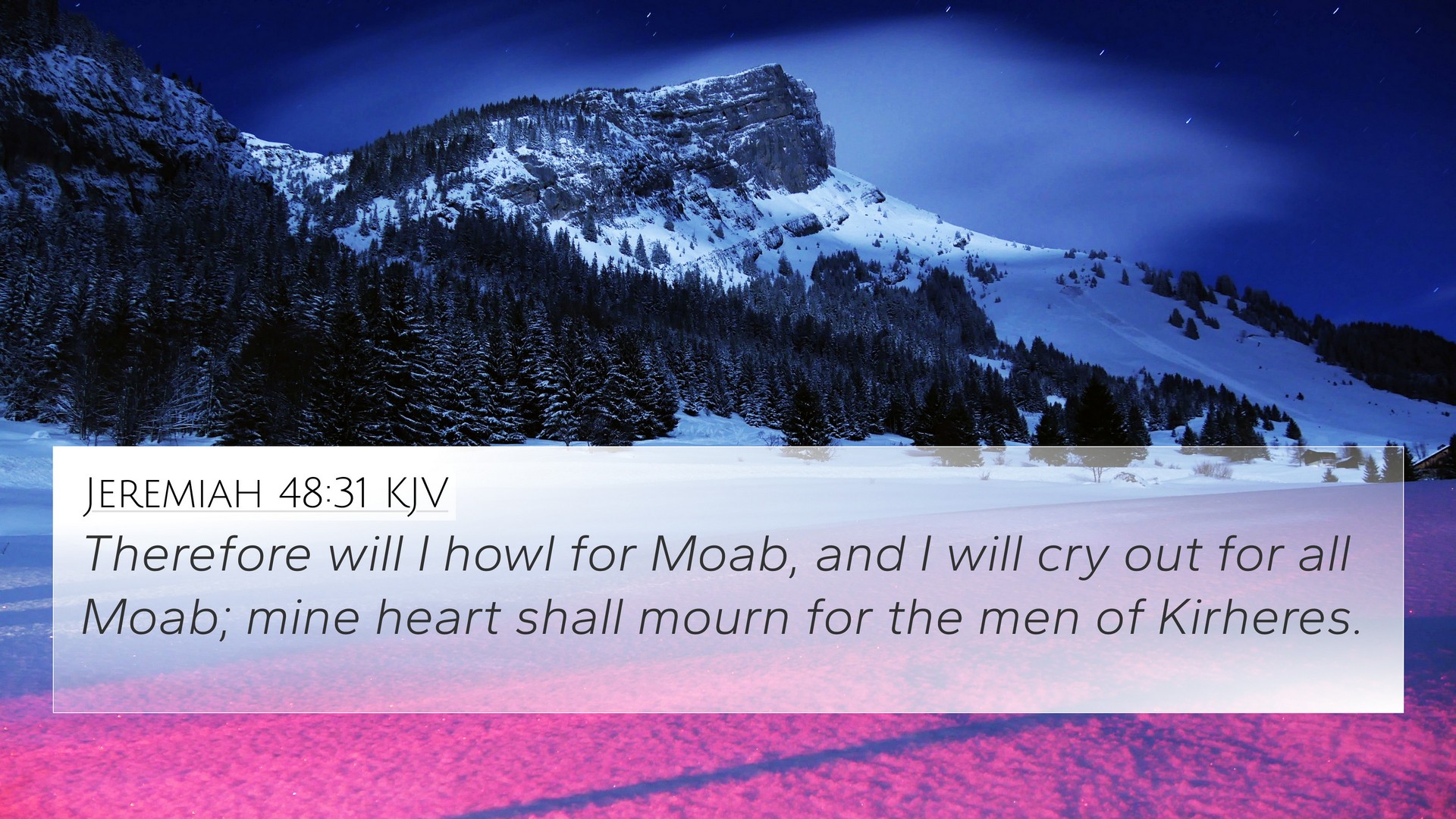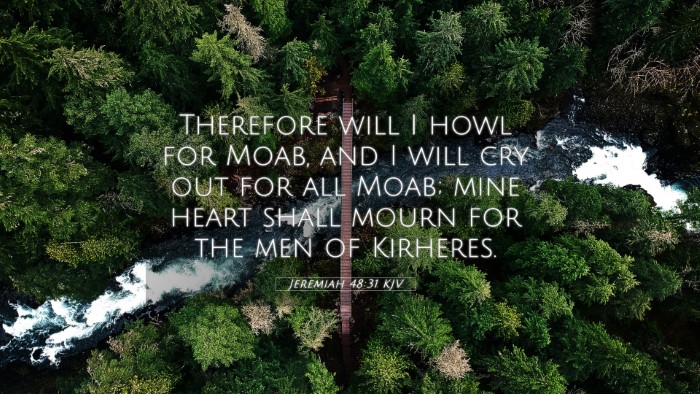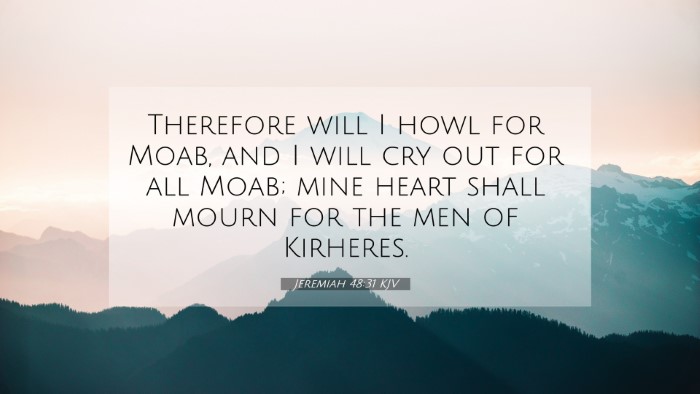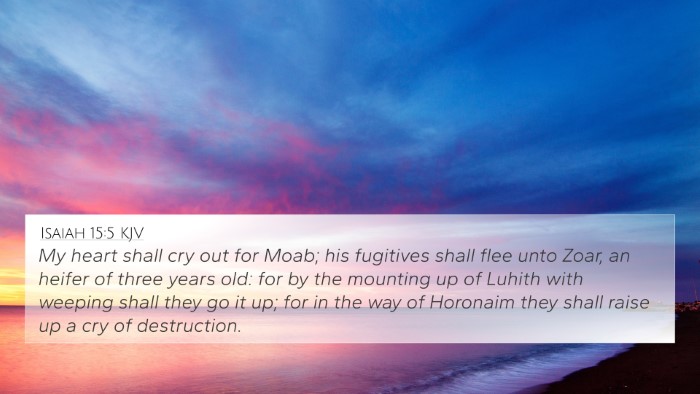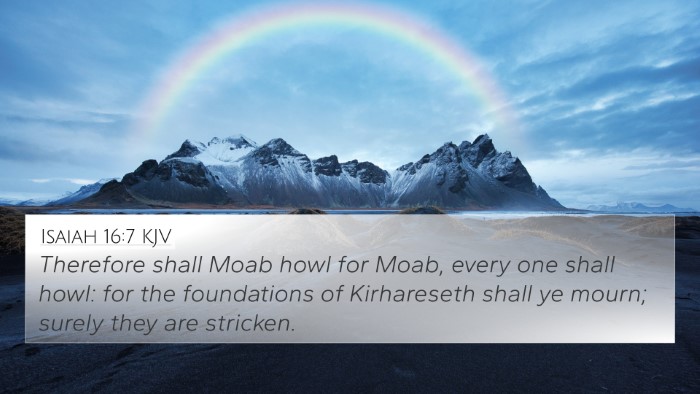Understanding Jeremiah 48:31
Jeremiah 48:31 states:
"Therefore will I howl for Moab, and I will cry out for all Moab; my heart shall mourn for the men of Kirheres."
This verse illustrates the deep sorrow and lamentation expressed by the prophet Jeremiah over the fate of Moab, highlighting the themes of judgment and compassion found throughout the Book of Jeremiah. Below is a comprehensive analysis of the verse derived from various public domain commentaries.
Verse Context
Jeremiah 48 is a prophecy against Moab, a nation that had continually opposed Israel. The prophet's mourning in this verse serves as a poignant reminder of the consequences of sin and the judgment that follows.
Insights from Commentaries
Matthew Henry's Commentary
Matthew Henry emphasizes that Jeremiah's lamentation reflects not just the imminent destruction of Moab but also a broader sorrow for the consequences of sin. He notes that Jeremiah identifies with the fate of Moab, illustrating a compassion that transcends national animosities.
Albert Barnes' Notes
Albert Barnes points out that Jeremiah's mourning indicates a personal connection to the events prophesied. He analyses the phrase “my heart shall mourn,” suggesting that true prophetic insight involves not only foreseeing judgment but also experiencing grief for those who suffer due to their choices.
Adam Clarke's Commentary
Adam Clarke elaborates further, suggesting that this mourning reflects the seriousness with which God regards the downfall of nations. He sees Jeremiah as a type of Christ, who mourns for the lost, drawing parallels between the fate of Moab and the consequences of rejecting divine guidance.
Thematic Connections
This verse, alongside the poignant lamentation expressed by Jeremiah, connects to several themes throughout the Bible, including:
- Judgment and Mercy: The balance between God’s justice and His mercy is a recurring theme. Jeremiah's lament shows the grief that often accompanies divine judgment.
- Prophecy and Fulfillment: Jeremiah’s role as a prophet underscores the importance of listening to God's warnings, a theme reiterated in both the Old and New Testaments.
- Human Compassion: The emotional response of Jeremiah displays the call for compassion even towards one’s enemies, relatable in Christ's teachings, such as loving one’s enemies.
Cross-References
Jeremiah 48:31 connects with various other scriptures that deepen our understanding of the verse. Below are some vital Bible verse cross-references that illuminate the themes present in this verse:
- Isaiah 15:1-9: A lamentation for Moab, paralleling Jeremiah's sorrow.
- Ezekiel 25:8-11: God's judgment against Moab.
- Matthew 23:37: Jesus weeping over Jerusalem, reflecting similar mourning for a nation.
- Romans 9:2-3: Paul expresses great sorrow for the lost among his own people, echoing Jeremiah’s grief.
- Luke 19:41-44: Another example of weeping over an unrepentant city, emphasizing prophetic compassion.
- Revelation 18:10: The lament for Babylon, reflecting the theme of judgment against nations.
- Jeremiah 9:1: Jeremiah's earlier profound lamentation for his people speaks to a similar heart of compassion.
Application for Today
The mourning of Jeremiah for Moab prompts believers today to reflect on their attitudes toward others. It challenges us to cultivate a heart that mourns for those in sin, promoting a spirit of intercession.
Moreover, understanding these connections between Bible verses emphasizes the relevance of scripture throughout time. Cross-referencing is a powerful tool for deepening one’s understanding of biblical themes and narratives.
Conclusion
Jeremiah 48:31 serves as a profound reminder of the compassion that the Lord has for all nations, as well as the grief that should accompany the awareness of sin and its consequences. Through careful comparative Bible verse analysis, we can draw deeper insight into God's character and His dealings with humanity.
